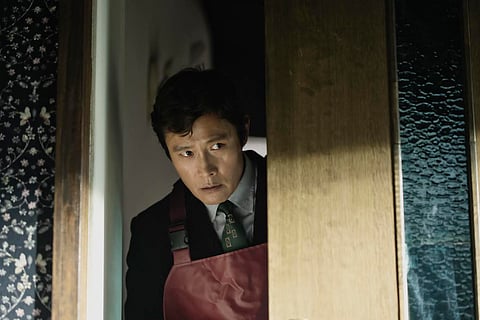Cinema Without Borders: Desperate Measures - No Other Choice
The only thing certain about life is uncertainty, more so nowadays, in the politically turbulent, financially unstable and socially precarious times. Park Chan-wook’s No Other Choice, based on American writer Donald E Westlake’s crime novel, The Ax, is a darkly comic look at the weird ways in which the defining human insecurity and desperation of this day and age can come to manifest itself and the extent to which people can go to stake a claim at what has been snatched away from them?
Korean superstar Lee Byung-hun plays Yu Man-su, a paper expert. Having been working for 25 years at the leading firm Solar Paper he leads a comfortable life with his wife Lee Mi-ri (Son Ye-jin), two children and two dogs in his newly refurbished childhood home surrounded by idyllic woods. But good days, like the bad ones, have a habit of not lasting forever. The rug gets pulled out from under his feet when Solar Paper gets taken over by an American firm and Man-su is given the pink slip.
Overnight the lifestyle has to undergo a change. Mi-ri suggests putting the home up for sale, the fancy cars have to make way for the cheaper ones, and the dogs are sent away to her parents' so that there’d be fewer mouths to feed. The cello lessons for the prodigious daughter are set to face the axe, even though her teacher recommends a higher level of training given her brilliance. The couple’s own dance and tennis outings stand cancelled, as does the Netflix subscription.
As jobs shrink and claimants to them increase, Man-su realises that his experience and expertise won’t be enough to get him a coveted position at the rival, Moon Paper. In response to this cutthroat business of career maintenance, the middle aged man hatches a plan to eliminate the competitors to the prized job. What follows are bizarre and riotous twists and turns that are at once madly funny, graphically violent and deeply poignant, all rolled in one.
Byung-hun plays his part—full of contradictions, trying to be in control of his fate despite the haplessness—with sincerity and relish as does the rest of the impeccable ensemble. You can’t help not feel for their problems and predicaments. Ye-jin, popular in India for her bright and peppy act in the Korean series Crashlanding on You, shows a more mellow side as an actor. She is the moral fulcrum in the midst of all the unconscionable goings-on around her, often having her find her own ethics in conflict.
The South Korean entry for the Best International Feature Film category at the Oscars, No Other Choice had its world premiere at Venice, followed by the North American premiere at Toronto and was the opening film at Busan, meeting with acclaim in each of its outings.
The reason is easy to understand; the essential universality is such that it can connect with people in any country, culture or context. Afterall, it's a relatable situation the world over: the cruel disparities at the heart of capitalism, the spectre of economic downturn and growing unemployment and the extremes it can lead to. The finale is powerful and ironic, even as it makes one ponder about the future of the man-machine dialectic and the yawning loneliness at the heart of it.
Chan-wook never lets the essential social commentary and critique—about workplace politics, brutalization of labour, corporate one-upmanship—get the better of all that is cinematic and vice versa. He strikes a fine balance between the two and is at his inventive best in transplanting the American story specifically to South Korea and deploying the elements of the crime cinema that the country is synonymous with to cook up a deliciously twisted scenario that is extremely engaging, incredibly entertaining and also sets one thinking. Is there a killer lurking in the most benign? Can the normal actually be a paradigm of abnormality and righteousness a front for immorality?
Chan-wook’s dexterity and craft is in great display while marrying the sound and visuals to the off-kilter plot and seamlessly handling the tonal shifts and transitions. A dance sequence plays out with as much flourish as the slicing of a human body. The disparate and contrary manage to converge and correspond, the dissonant threads get underlined by a unique sense of harmony. There’s order in the chaos, method in the anarchy and even the inhumane comes with a compassionate edge. Absurd times that we are in deserve Park Chan-wook's absurdist, audacious leap of imagination.

